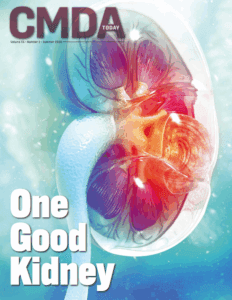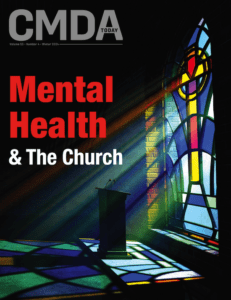Turning the World Right-side Up!
Paul was accused of seditious behavior—disturbing the peace, turning the world upside down—simply for speaking publicly about Jesus, and he was imprisoned for it. The Christian community, particularly evangelicals, have largely avoided turning the world upside down.
John Patrick, MD
Paul was accused of seditious behavior—disturbing the peace, turning the world upside down—simply for speaking publicly about Jesus, and he was imprisoned for it. The Christian community, particularly evangelicals, have largely avoided turning the world upside down. Some healthcare professionals have lost their positions for refusing to participate in euthanasia. Most of us have forgotten the importance of being salt and light and being able to give serious reasons for our faith. This is because the church is a place where no one says anything that might challenge someone. The church ought to be a place of serious, even heated, discussion.
John Milton, a 17th-century English poet, put it like this, “…Where there is much desire to learn, there of necessity will be much arguing, much writing, many opinions; for opinion in good men is but knowledge in the making.”[1]Argument must, however, be without rancor. In the modern social media world, political correctness, wokism and critical race theory set the tone, bringing much rancor, disreputable personal attacks and cancellation of people without due process. It takes a little courage; nonetheless, we must push back like first-century Christians, except we need to put the world right-side up! We can start in our families and churches by learning to separate our person from our opinions. We should always be seeking after the truth. Anyone who corrects us dispassionately is practicing Christian love; moreover, we should practice the habit of thanks for such correction. Our minds are a gift, and we will be judged for how we transform them (Romans 12:2).
This requires serious reading and discussion at home, work and church. Years ago, when medical students began visiting our house, they surprised us. We understood the enjoyment of hospitality and food, yet we were unprepared for their appetite for argument as an important part of Bible study. Although they came from good homes, argument was not encouraged. (When your children disrupt serious reading and prayer, don’t get mad; rather, ask them to defend their behavior.)
Following the 18th-century revival in England, social conditions changed with almost miraculous speed. Of course, the primary reason was the Holy Spirit, and He worked through the minds of new Christians who were hungry to understand the Scriptures. The mandatory adult class meetings, instituted by theologian/evangelist John Wesley, were where intelligent yet uneducated blue-collar folk learned to express themselves, which changed politics! Child labor was abolished, prisons were reformed and the repeal of the corn laws allowed dramatic economic growth. By 1803, British politician and abolitionist William Wilberforce had won the hearts and minds of Britain, so Parliament was forced to abolish plantation slavery in the colonies. (Archbishop of Canterbury Anselm had outlawed slavery in Britain in the 11th century, and most of Europe had done the same.) In the 18th century and throughout the Industrial Revolution, social injustice was flagrant in British society, so political consequences inspired by new Christians were inevitable. Sadly, the social gospel ultimately displaced the active evangelism of the Methodists. This should be a warning to all of us—remember the church at Ephesus. Our current behavior does not convict contemporary society. We need to do it again. First, we must always start our arguments by questioning what our opponents are presuming, then ask whether they can defend their presumption. In the beginning what? Either God or no God. Neither can be proved irrefutably. However, either someone or something started it all, and no scientist believes matter is eternal, as Greek philosopher Aristotle did. They usually beg the question by saying, like Laplace, they do not need God to do science, which is true, but also a flagrant avoidance of the history of science.[2] (If you haven’t yet gotten your copy of Rodney Stark’s book For the Glory of God and read, marked and inwardly digested the chapter on God’s handiwork, then put this magazine down and order it now![3]) Our first duty in our professional arena is not to back down on this issue. Medical ethics, in particular, have been transformed from being based on a tacit acknowledgement of medicine in the West being the product of Judeo-Christian thought, to tacitly atheistic secular bioethics which has no solid foundation.
As C.S. Lewis constantly affirmed, all argument must start with a self-evident statement. For ethics, without God and a belief in ultimate judgment, there is no self-evident statement; bioethics is a toothless tiger.[4] For Christians, the fear of the Lord is the beginning of courageous ethics. Then you can proceed to read Lesslie Newbigin’s Foolishness to the Greeks and get your mind around the idea of tacit knowledge, which lies at the heart of both modern science and your conversion.[5] Both are not totally described by reductionistic logical rationality. Gödel showed the axioms of science cannot completely account for arithmetic.[6] Because of this, Wittgenstein lost interest in the work of Whitehead and Russell, who thought they had a solid rational logic and could explain everything; however, both admitted later they did not. [7],[8]
Sadly, a number of scientists still have not caught up with this reality. Wittgenstein turned to the study of how we use language in ordinary settings, concerning himself with more simple and elemental activities we perform when using mathematics, and discovered Gödel’s result on incompleteness should be what we expect! In his book The Illusion of Technique, William Barrett wrote “limitative theorems” should in fact be called “liberating theorems” because they show human creativity exceeds any mechanism which might seek to contain its own constructs. We (humans) are always more than any machine we may construct.[9] I hope he’s right.
Ethics are no exception. We always try to write complete rules that end up having endless qualifications. Knowing the Georgetown Mantra does not make one ethical or pithy. As one ethicist put it to me (off the record, of course), “I only teach ethics, I don’t practice them.” The Judeo-Christian tradition has always understood the spirit is willing, but the flesh is weak (Mark 14:38). Much to the chagrin of universities and utopian politicians, our problems are primarily with the will, not with our ignorance. We cannot all not know something like the Ten Commandments is true with a capital T (with a nod to J. Budziszewski).[10]
It follows that all utopian dreams inevitably fail and end in totalitarianism as former leader of the Soviet Union Vladimir Lenin understood when he wrote in a letter, “When we have gotten rid of God it will be necessary to legitimize terror.” The intellectual icons of the arts faculties over the last century have been Darwin, Nietzsche, Marx and Freud—all intellectual atheists, and only Nietzsche is honest about how bad the death of God would be. Freud knew human desires, particularly sexual desires that he wanted to liberate, had to be controlled (repressed in his terms) if society was to continue to have a modicum of civility, although he was pessimistic about the outcome. Marx was optimistic and wrong. Dostoyevsky was right when he predicted communism would cost a million lives in the short-term, yet the denial of the fall would cost much more in the long-term.[11] If our culture does not repent, it will die. When cultures die, the first thing to go is a common story of meaning upon which depends our moral stability.
The management of COVID-19 with its denial of human dignity and freedom in Canada rapidly evolved into completely unjustifiable totalitarianism, exemplified by the freezing of protestors’ bank accounts and showing what a utilitarian ethic of measurables produces. Some scholars got it right, such as the Great Barrington Declaration, though only Sweden followed their advice, and I don’t expect any apologies to those who got it right.[12] (See Peter Robinson interviewing Jay Bhattacharya on Uncommon Knowledge for a succinct account.[13]) I hope someone can point me to a bioethicist who got it right.
Now our profession is beginning to see the longer-term cost of COVID policy, particularly as it has affected early childhood, school and university students who are way behind in their education and emotionally flattened. For most of us, those were the times of great enthusiasm with learning and risk taking under the watchful eye of those who loved us. Most of you want to know where your children are, all the while. At 15, I disappeared on a bike and rode to Italy and back, sending a postcard every day! What freedom! Now we have record drug abuse, suicide and apathy with multitudes of people refusing to work. They will turn up in your office with an emergency expecting you to fix them; however, the problem is not susceptible to chemical correction, because it is spiritual.
Much more can be said of this story, which has its genesis in the late Middle Ages and was accelerated by the success of reductionistic science that concerned itself only with measurables. When copied by the arts faculty, it turned our culture away from virtue and the great unmeasurables of love and truth toward personal authenticity in which feelings trump truth. Critical race theory, like all heresies, puts a good thing in a wrong place. Racism is always wrong; nevertheless, it cannot bear the weight of being the foundation of ethics and politics, as it will fail. The first place we addressed racism, without even knowing it, was in the church where we learned the Word says we are all one in God’s kingdom where there is neither slave nor free, male nor female (Galatians 3:28). Only in Christ can we have the true freedom of being able to do what we know to be good.
[1] From Milton’s book Areopagitica
[2] Pierre-Simon Marquis de Laplace was a French scholar and polymath whose work was important to the development of engineering, mathematics, statistics, physics, astronomy and philosophy.
[3] Rodney William Stark is an American sociologist of religion who was a longtime professor of sociology and of comparative religion at the University of Washington and Baylor University.
[4] C.S. Lewis, from The Abolition of Man. Lewis was a British writer and lay theologian. He held academic positions in English literature at both Oxford University and Cambridge University.
[5] James Edward Lesslie Newbigin was a British theologian, missiologist, missionary and author
[6] Kurt Friedrich Gödel was an Austrian/Czech logician, mathematician and philosopher. Considered along with Aristotle and Gottlob Frege to be one of the most significant logicians in history.
[7] Ludwig Wittgenstein was an Austrian-British philosopher who worked primarily in logic, the philosophy of mathematics, the philosophy of mind and the philosophy of language.
[8] Alfred Whitehead (English mathematician and philosopher) and Bertrand Russell (British philosopher and logician) co-created the Principia Mathematica. In this work, Whitehead and Russell sought a unifying theory of mathematics based on logic and arithmetic—that is, they sought to secure all mathematical truths from a few assumptions of logic.
[9] William Christopher Barrett was an American author and professor of philosophy at New York University.
[10] J. Budziszewski is an American professor of government and philosophy at the University of Texas, Austin, where he has taught since 1981.
[11] Fyodor Mikhailovich Dostoevsky (Dostoyevsky) was a Russian novelist, short story writer, essayist and journalist.
[12] The Great Barrington Declaration – As infectious disease epidemiologists and public health scientists we have grave concerns about the damaging physical and mental health impacts of the prevailing COVID-19 policies and recommend an approach we call Focused Protection.
[13] Peter Robinson interviewing Jay Bhattacharya on “Uncommon Knowledge”: www.youtube.com/watch?v=zG7XZ2JXZqY&t=1s




